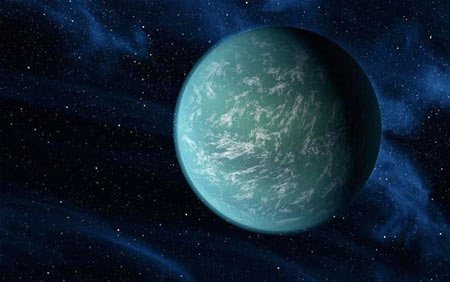|
 Kepler is searching for planets as small as Earth, including those orbiting stars in a warm, habitable zone where liquid water could exist on the surface of the planet. |
|
A planet more like Earth than any yet discovered has been identified as a potential future home for mankind. Kepler 22b contains both land and water and has temperatures which average around 72 degrees (22 Celsius). It also contains the right atmosphere to potentially support life. It is, however, 600 light years from Earth. The planet, where a year lasts 290 days, was first spotted two years ago. However, Nasa scientists using the agency’s Kepler space telescope have now concluded that it offers the best hope yet for future human habitation outside the Solar System. One of the key criteria for a planet to be habitable is that it remains roughly the right distance from its main star to be neither too cold nor too hot. This range of ideal temperatures is known to scientists as the “Goldilocks” zone, as the temperature is “just right” for life. Bill Borucki, Kepler principal investigator at NASA Ames Research Centre, said: “We have now got good planet confirmation with Kepler 22b. “We are certain that it is in the habitable zone and if it has a surface it ought to have a nice temperature.” There are now three planets outside the system, known as exoplanets, which experts believe could potentially be colonised by future generations. In May, French astronomers identified Gliese 581d, pronounced “gleezer”, which is far closer at around 20 light years away. It is about six times the mass of Earth and is one of a family of at least six planets. In August, a team from Switzerland reported that another planet called HD 85512b and 36 light years away seemed to be habitable. The planet is in the constellation of Vela, measures around 3.6 times the Earth's mass. According to an online catalogue that indexes bodies outside our solar system by the Planetary Habitability Laboratory (PHL) of the University of Puerto Rico at Arecibo, a total of 47 exoplanets and exomoons are potential habitable candidates but not enough research has been done to be sure. (Read by Emily Cheng. Emily Cheng is a journalist at the China Daily Website.) (Agencies) |
天文学家最新发现了一颗被认为是迄今为止和地球最为相像的行星,而且被视为可能成为人类未来的居住地。 这颗名为“开普勒22b”的行星包含陆地和水,平均气温在72度(22摄氏度)左右。 该行星还拥有能维持生命的大气。 不过,这颗行星距离地球长达600光年。 这一行星两年前被首次发现,该行星上的一年为290天。 现在,美国宇航局的科学家用宇航局的开普勒太空望远镜勘测后得出结论,称这一行星是太阳系以外最有希望成为未来人类居住地的星球。 一颗行星是否宜居的关键标准之一是和主恒星的距离要适当,既不过冷,也不过热。 这一理想温度的范围被科学家称作“金凤花区”,这一温度区域对生命“正合适”。 美国宇航局艾姆斯研究中心的开普勒项目负责人比尔•伯鲁奇说:“我们现在已经证实‘开普勒22b’适合居住。” “我们确定该行星位于宜居区域内,如果这一行星有地表的话,温度会很适中。” 目前太阳系外有三颗“系外行星”被专家认为人类未来可能移居。 今年五月,法国天文学家发现宜居行星“格利泽581d”,该行星比“开普勒22b”要近得多,距离地球约20光年。 “格利泽581d”的质量约为地球的六倍,是一个包含至少六颗行星的家族中的一员。 今年八月,来自瑞士的一个研究团队报告称他们发现了另一个疑似宜居行星“HD 85512b”,距离地球36光年。 该行星属于船帆星座,质量约为地球的3.6倍。 据阿雷西沃波多黎哥大学的行星适居性实验室在网上发布的太阳系外天体目录,共有47个系外行星和系外卫星可能是宜居星球,不过还需更多研究才能加以确定。 相关阅读 (中国日报网英语点津 陈丹妮 编辑:Julie) |
|
Vocabulary: goldilocks: 金凤花 exoplanet: 太阳系外行星(简称系外行星) mass: 质量 constellation: 星座,constellation of Vela是船帆座。 index: 把……编入索引 exomoon: 太阳系外卫星(简称系外卫星) |
